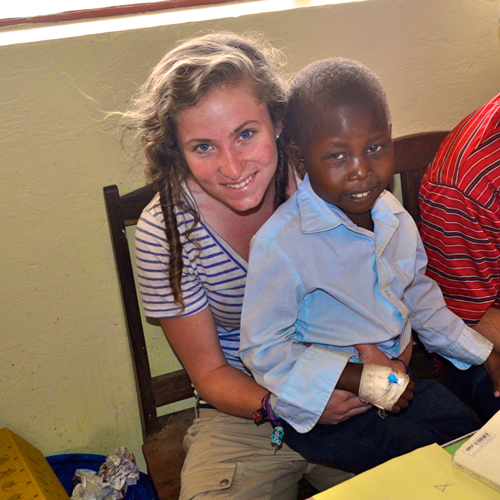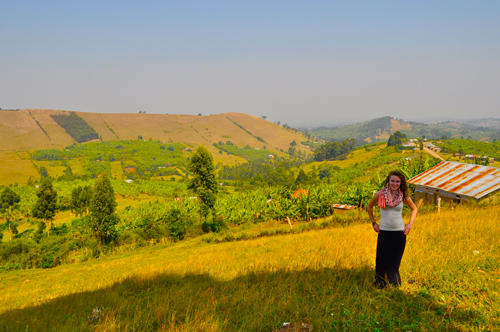
By Annaliese Snodgrass
The way to Rukungiri, Uganda lies in a single, mostly unpaved road stretching from the country’s south central region deep into its southwest corner. In its many unpaved patches, the passing vehicles kick up the vibrantly red earth beneath them, leaving a dusty maroon veneer on the surrounding vegetation. As I watched the little mud huts and the patchy tin roofs covering one-room concrete houses flick past an incredibly lush green backdrop, a feeling unlike anything I had experienced began to well up inside me.
I passed by, soaking in my new surroundings, and I watched scores of children wave enthusiastically to me, something that I wouldn’t normally see in my native New York City. Their curiosity and enthusiasm gave me an overwhelming sense of appreciation for this culture, but beyond that, it made me excited to spend two months working here. Not even the memory of my only credit card being swallowed by the airport ATM without explanation the night before was enough to wipe the smile off my face on that bumpy nine-hour drive.
Late that night we arrived at Nyakibale Hospital to begin our 7-8 week internship with the Initiative to End Child Malnutrition (IECM). Although the IECM program in Uganda takes a primarily medical focus in addressing malnutrition, our daily responsibilities stretched far beyond the boundaries of the hospital wards.
The need to cover several subsidiary projects had us engaged in a variety of different activities including work on microfinance initiatives designed to empower mothers of inpatients; nutritional education programs; and training of village health teams and nursing students. With only five other interns, every day was busy and no two days were the same. The only constant was the scorching African sunshine beaming down on the six of us.
My work at IECM exposed me to many things that, at times, deeply moved and saddened me. In my life I had not yet encountered the level of sickness and frequency of death that I did at that hospital, and at times I had to force myself to take a step back just to process it all. Yet in the midst of all of this human suffering, I was surprised to find that Nyakibale is home to some of the kindest and most positive people I have ever met.
In my first few weeks I was surprised to find that when walking past the pediatric ward, usually packed with families and children afflicted with multiple co-morbidities such as malaria, HIV and typhoid fever, that my gaze was met not by a sharp glare or furrowed brow, but instead by gentle, shy, smiling eyes. Where I had expected to meet closed hearts and exclusionary attitudes towards a cultural outsider, or “muzungu”, like myself, I found only brilliant grins and a genuine desire to communicate and connect to people so different from themselves.
What came as an even bigger surprise was that the happiness and fulfillment I felt from having the opportunity to participate in a program that strives to provide a viable and sustainable solution for these people was so strong that it overpowered the sadness that came with an unfiltered view of the suffering in the hospital.
This sense of fulfillment carried me through many minor pitfalls that I ran into along the way that summer, as well as one major pitfall that threatened to derail my participation in the project altogether. One day, during the second of seven weeks of my internship, I was walking outside when I felt a sharp pain shoot through the bottom of my foot. Upon inspection, I discovered that a used surgery needle, which had not made it into the designated sharps box but instead had been accidentally discarded on hospital grounds, was lodged in the bottom of my shoe and had gone through to pierce my foot.
Because I was outside, the chances of the needle having HIV on it were incredibly small, as the virus cannot live outside the body, but in a country with a very high incidence of HIV, the risk was not one that I was willing to take. Thus, I made the decision to take anti-retrovirals (ARV’s) for 30 days to prevent the disease from forming.
However, the side effects of ARV’s are some of the worst the field of medicine has to offer, including heavy nausea, vomiting, fever, headaches, weak muscles and stomach pains, among others. Although the side effects do come in waves, I was incredibly ill for most of the duration of my stay. At times I felt absolutely miserable, a feeling that was compounded by the steady diet of rice, beans,and potatoes that the nuns kindly served us every day for lunch and dinner.
But even when I was experiencing severe pain, I would not have changed my decision to come to Uganda. Even with what seemed like the worst luck in the world, I treasured, and still treasure, my time there. The environment, the people, the culture and, above all, the work I did encompassed an experience that is invaluable to me. It exposed me to a side of humanity that I have never seen before and allowed me to do so from a point of view normally unseen by most people.
After the needle prick, outreach days became a source of internal conflict for me. These were the days in which one or two interns could accompany the outpatient therapeutic care (OCT) team, which was designed to bring malnutrition care to children who do not have the ability to travel to the hospital. As such, OTC targets some of the poorest and most remote villages in the district of Rukungiri.

Unfortunately for me, none of the roads to any of these villages are paved, and the travel time for each spans from 45 minutes to 2 hours. A hot car in the sun even on the smoothest of roads would be a lot for anyone on ARV’s to handle, but a hot car on bumpy roads, with six or seven people packed into five seats and the windows rolled up to avoid inhaling the dust cloud following the car, is almost unbearable for someone undergoing interferon therapy.
From my first outreach experience, I knew just how miserable that drive made me, but I still elected to go every time that I had the chance. Today I still have trouble explaining the mixture of emotions that welled up in me as I helped weigh and measure each child, and depending on the severity of malnutrition, distribute a week’s supply of nutritionally fortified food.
There in the field, even more than in the hospital, I felt a twinge of sadness as I saw firsthand the incidence of this disease on these children. But this sadness was swept away by the happiness and pride that came from helping them. This feeling gave me the courage to endure the pain of the long ride there and back, a decision for which I always seemed to be kicking myself at the start of the return journey as the nausea inevitably set in.
Although I didn’t think it was possible, Uganda had one last pitfall for me before I left. I hadn’t let the ARV’s prevent me from rafting the Class 5 rapids of the Nile River with the rest of the interns on one of our weekend trips.
Due to either swallowing too much Nile water, food poisoning, or some other unknown factor, my condition seriously worsened for a few days. While part of me wished I could have stayed to finish the final two weeks of the internship, it was the collective decision of the program directors that after sticking it out for three of the four weeks of ARV’s, it was best that I be sent home due to a medical emergency.
Upon returning to New York, most people asked me if I regretted going at all, considering everything that happened. Contrary to popular expectation, I have always replied that I would not change my experience for the world. It was an eye opening experience that taught me things about myself and about the world that I will keep with me for the rest of my life.
Being on the ground with people whose lives were much harsher than my own made me understand the power of personal connection and gave me a glimpse of the grace and openness that is present in the midst of great hardship, one which the Ugandan population faces daily.
While stepping on the needle did fundamentally alter my experience, in retrospect, I think of this alteration as a positive one as it pushed me to realize my own ability to persevere in the face of adversity. My time there gave me a new perspective on my own hardships in comparison with those to whom I was ministering, something that I have not forgotten since my return.
Any complaints of pain that might have crossed my lips died in my throat as I sat next to children who could not afford the medication I was on, and as a result, had contracted the deadly disease.
Above all, my work with IECM gave me a personal understanding of the value of development projects that work from within the community to build their capacity to combat their own problems, rather than those that impose external methods from the top-down. I only hope that my future work in international development will allow me to bring this insight to other development projects so that all over the world, communities like Rukungiri can receive help that is not only effective, but also sustainable.
Annaliese Snodgrass will graduate this spring with an Honours degree in International Development Studies and a minor in Environmental Studies. Prior to her trip to Uganda, Snodgrass completed a summer internship at the Massachusetts General Hospital Division of Global Health and Human Rights and Harvard University’s Global Hunger Initiative. While there, she was involved with numerous initiatives involving maternal health in rural communities, specifically emergency responses to post-partum hemorrhaging, the prevention of sex and human trafficking in developing areas, child malnutrition, sustainable microfinance programs, and development aid funding. In addition, Snodgrass attended two sessions of the United Nation’s Commission on the Status of Women, to hear representatives from across the world share innovative ideas and programs to improve conditions for women throughout the world.
